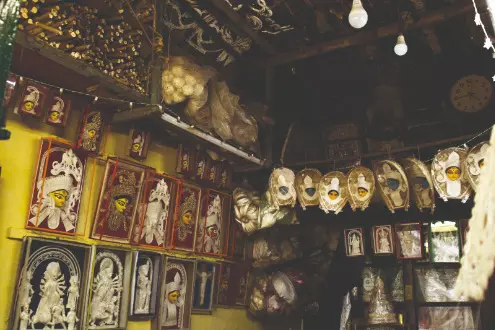‘Shola’ idol making: A fragile art struggling for survival

Kolkata: In Bengal’s festive traditions, shola, often called “wood sponge”, has long been a sacred medium for idol making. From intricate crowns and mukuts of Durga to entire idols crafted from the delicate white plant, shola once symbolised purity and creativity in ritual art. But today, this craft is struggling against time and circumstance.
Shola is sourced from marshy wetlands, mostly from places like Katwa, Canning and Jaynagar. With rapid construction and the spread of development in villages, these wetlands have largely disappeared. As a result, the availability of raw shola has diminished sharply. This decline has led to soaring prices, forcing many idol-makers to shift to alternatives.
Once shola was replaced by thermocol, widely used for its cheap price. But in recent times, it has been banned by the Central Government because of its non-biodegradability. While this restriction was well accepted as an eco-friendly step, artisans complain that the government fails to provide a sustainable replacement, as shola production is also at its lowest. “Thermocol was cheap and easy to work with, but once it was banned, no proper substitute was introduced. On the other hand, shola is becoming rarer every day,” said Sujit Malakar, a shola craftsman.
Still, artisans cherish the elegance and tradition of shola idols. “My father Asutosh Malakar was the first to export shola idols in 1962. It is very unfortunate that I’m fighting to preserve this art form,” said veteran artisan Sambhu Nath Malakar. Bonkapasi in Hooghly, often called “Shola-Gram”, remains one of the last strongholds where thousands of families work on shola ornaments and idols.
Especially the elements for complete shola decoration, which include sari, aanchal, chik (necklace), mala-saj (pendant), mukut-chura (crown), beni-makar (earrings), and churi-bichchu-krishnachura (bangles), are prepared here. Yet, younger generations are turning away from the craft, preferring more lucrative professions. Abroad, too, the demand for shola idols has fallen in recent years because of their high price and lower durability compared to fiber, which is easier to export and lasts longer. But despite these challenges, artisans insist that the fine art and sobriety of shola work remain irreplaceable.



